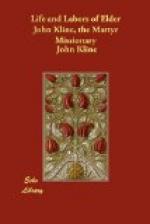But I have touched only the hem of sin’s garment in what I have said. If the soul or will of man were still very good, I mean to say here that if man had not lost his love for his fellow-man and his love for God; in other words, if man still loved the Lord his God with all his heart and his neighbor as himself, feebleness of body and weakness of mind would be matters of small moment. The body is soon done with any way; and the mind or intellect is still sufficiently clear for all the purposes of life in this world; and when once disengaged from the body that here clogs and fetters it,—as it will be at death,—in the hope of being lifted to a higher sphere of perception and thought, the loss to man suffered by the fall in these two departments of his being would be comparatively small.
But man’s will or inmost love is the secret spring of life. From this all his affections flow; and right here we find his Marah, the bitter waters of his soul. In reading the story of the children of Israel in the wilderness we learn that they came to a place where the waters were all bitter. Brethren, that place is right in our own hearts. Our hearts are the springs from which these bitter waters flow in the form of “evil thoughts, adulteries, fornications, murders, thefts, covetousness, wickedness, deceit, lasciviousness, an evil eye, blasphemy, pride, foolishness.” Mark 7:21, 22. What an outflow of bitterness! Enough to flood a world to destruction! And this destruction had come, and its arm would have held its power over man eternally, had not the great Prophet, the Moses of love, come and cast a tree into the waters whereby they were made sweet. The Lord in his Word is this tree. He is the tree of life, whose leaves are for the healing of the nations. His voice comes to us from far: “I am the Lord that healeth thee; for the Son of man came to save that which was lost.”
It is of infinite importance for us to know how he saves us, what we are expected to do, how we are to work with him and to what extent. I will try to give some light on this from the Word itself. Jesus said to his disciples: “If any man walk in the day, he stumbleth not, because he seeth the light of this world. But if a man walk in the night, he stumbleth, because there is no light in him.” This beautiful and striking parable, showing the benefit of knowledge and the disadvantage of ignorance, lights the sinner’s way for his first step toward the Lord. Knowledge, which is light from the Lord through his Word, is the very first thing every one must receive. The sinner first receives the clay and the spittle applied to his blind eyes. He does not get his sight from this application. When he hears the Gospel with something of a desire to have his eyes opened he is receiving this anointing of his eyes. He must go to the pool of Siloam and wash before he can have sight. This washing in the pool is the first step in that humble spirit of obedience by which the understanding




